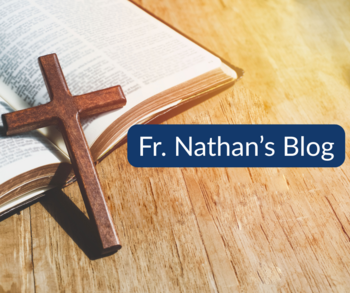Seventh Sunday of Easter
-
 June 2, 2025
June 2, 2025“Lord, do not hold this sin against them.” (Acts 7:60)
The first reading this weekend from the Acts of the Apostles presents the martyrdom of St. Stephen, the Church’s first witness unto death. As he was being stoned by an enraged crowd, Stephen—filled with the Holy Spirit—lifted his eyes to heaven and saw Jesus standing at the right hand of God. In his final breath, he echoed Jesus’s own words from the cross: “Lord, do not hold this sin against them.” Among those witnessing this was a young man named Saul—who would later become Paul, the great Apostle to the Gentiles. This moment marked not just Stephen’s death, but the beginning of a Church willing to love to the point of sacrifice.
When someone wrongs you deeply, what do you do? What fills your heart in the moment of betrayal, injustice, or violence?
For Stephen, it was forgiveness. It was mercy. And more than that- it was love.
Such a response is beyond our human capacity. It’s divine. And that’s what the Church is called to be: a people so filled with Christ that even in persecution, we become mirrors of His love.
Pope Francis, in his Catechesis on Acts, highlights Stephen as “the first in a long line of courageous witnesses”—those whose faith is so alive, so real, that they face death not with hate, but with hope. He tells us that martyrdom is not just a thing of the past- it is the ultimate expression of love, a testimony that the Gospel is worth everything.
In Evangelii Gaudium, Pope Francis calls for a Church that is not afraid to go out to the peripheries- even when it’s risky, even when it costs us comfort, even when it demands our lives (EG,49). He says, “The Church must be a place of mercy freely given, where everyone can feel welcomed, loved, forgiven, and encouraged” (EG,114). Stephen lived this all the way to his last breath.
Bishop Ruggieri’s invitation for us to reclaim Sunday as the heart of discipleship shines through here. Because the Eucharist we celebrate on Sunday is nothing less than the memorial of Christ’s death and resurrection. When we receive the Body of Christ, we are receiving the One who said from the Cross, “Father, forgive them.” And we are being formed into that same Body- so that we too might become Eucharist for others: broken, given, poured out in love.
Stephen’s martyrdom wasn’t just a death—it was a witness that shook the soul of Saul. It was a seed of transformation. That’s what radical love does. It changes people. It changes the world.
Questions
- Stephen forgave his killers. What does his example teach us about the power of forgiveness in today’s world?
- How does receiving the Eucharist on Sunday strengthen us to love others, even in the face of hardship or rejection?
- What might it look like to love so boldly in our own lives that others are changed by our witness?
- Where are we being called to offer radical love and mercy in our community?
- How can our parish become a place where sacrificial love is visible and transformative?
Jesus, fill us with Your Spirit, that we may love as You loved—even unto the cross. Make us bold in witness, generous in mercy, and radiant in hope.